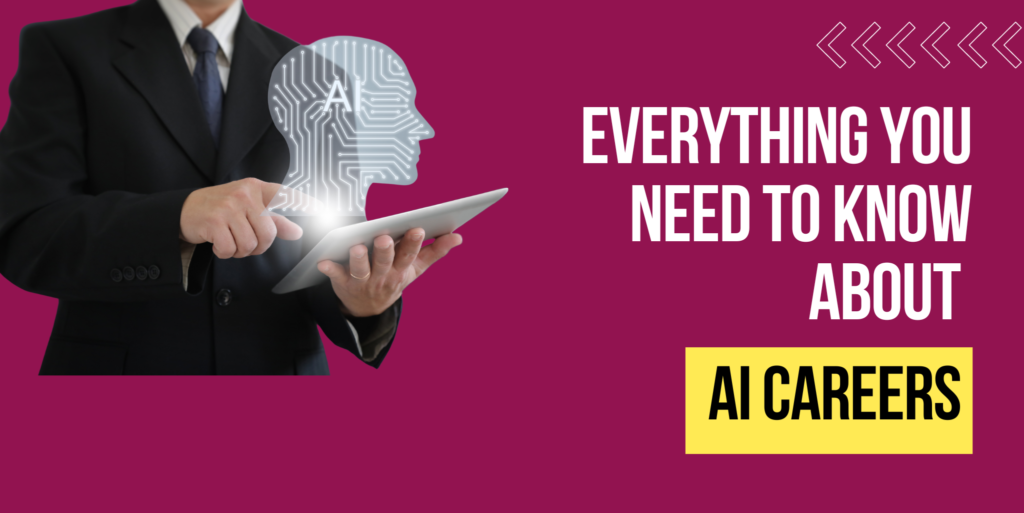Artificial Intelligence is known for innovation, changing many sectors and unlocking new possibilities. In the current era, AI influences every aspect, from virtual assistants and self-driving cars to personalized recommendations on streaming platforms. We’ll get into the detailed guide to artificial intelligence, Considering its importance, analyzing its advantages and disadvantages, and highlighting some of the most high-paying careers in the industry.
What is Artificial Intelligence?
Artificial intelligence, often AI, is the term used to describe how computers, usually computer systems, can simulate human intelligence processes. Some processes are learning, reasoning, problem-solving, perception, and language comprehension. Artificial intelligence (AI) systems are made to evaluate vast amounts of data, spot trends, and make judgments with little help from humans. This field includes some subfields, including robotics, computer vision, machine learning, and natural language processing.
How Does Artificial Intelligence Work?
Artificial intelligence (AI) uses mathematical models, algorithms, and massive datasets to teach robots to do activities that have historically needed human intelligence. Without explicit programming, computers may learn from data and gradually improve their performance thanks to machine learning, a subset of artificial intelligence. Data is sent into algorithms as part of this learning process, and the algorithms modify their parameters in response to input to maximize performance. AI has advanced significantly, mainly in deep learning, an area of machine learning that draws inspiration from the composition and operation of the human brain, especially in speech and image recognition.
Why is Artificial Intelligence Important?
Artificial intelligence’s importance cannot be overstated. Artificial Intelligence (AI) technologies possess the capacity to optimize workflows, boost productivity, and stimulate creativity in diverse sectors. AI-powered diagnostic technologies in the healthcare industry can evaluate patient data and medical imaging to help doctors make precise diagnoses and individualized treatment plans. Artificial intelligence (AI) algorithms in the financial sector examine consumer behavior and market trends to make informed investment decisions and identify fraud. Furthermore, AI-enabled automation can revolutionize various sectors, including retail, customer service, transportation, and manufacturing, by boosting efficiency and lowering costs.
Advantages and Disadvantages of AI
Advantages:
- Increased Efficiency: Artificial intelligence (AI) technologies enable companies to allocate their human resources more effectively and concentrate on higher-value jobs by automating repetitive tasks.
- Improved Decision Making: Artificial intelligence (AI) systems can examine large, complicated datasets and spot patterns that humans might miss, which helps them make better decisions.
- Enhanced Personalization: AI-powered solutions may customize recommendations and experiences to match personal preferences, increasing user engagement and happiness.
- Cost Savings: AI technologies can help companies reduce expenses and streamline operations by automating processes and decreasing errors.
- Innovative Solutions: AI stimulates innovation by making it possible to create cutting-edge goods, services, and solutions that solve complex problems and provide businesses with an advantage over their competitors.
Disadvantages:
- Job Displacement: Artificial intelligence (AI) technologies can potentially increase unemployment and inequality by eliminating jobs in some industries.
- Bias and Fairness: AI systems are vulnerable to biases in the training data, which can result in unjust or discriminatory outcomes, especially in hiring, lending, and criminal justice.
- Privacy Concerns: To operate efficiently, AI systems frequently require enormous volumes of personal data, which raises concerns over data security, privacy, and surveillance.
- Ethical Dilemmas: The advancement and application of AI technology raise ethical questions about transparency, accountability, and the potential consequences of self-governing decision-making.
- Dependency on Technology: As society grows increasingly dependent on AI technologies, there is a risk of dependency and greater vulnerability to unexpected problems such as cyberattacks and system breakdowns.
High Paying Careers in AI
- Machine Learning Engineer: To tackle challenging issues and streamline procedures, machine learning engineers create, build, and apply machine learning models and algorithms. They must be proficient in data analysis, statistics, and computer languages like Python.
- Data Scientist: Data scientists use machine learning algorithms and statistical methods to gather insights from massive databases. They have expertise in domains like marketing, finance, and healthcare and are skilled in programming and data visualization.
- AI Research Scientist: To develop the field of artificial intelligence, AI research scientists carry out both theoretical and practical investigations. They also create new models, algorithms, and approaches to solve modern problems and expand AI’s potential.
- Robotics Engineer: Robotics engineers create, construct, and program robots for various uses, including manufacturing, industrial automation, healthcare, and entertainment. They need knowledge of programming, electronics, and mechanical engineering.
- Natural Language Processing (NLP) Engineer: NLP engineers create systems and algorithms that let computers comprehend and produce human language. They develop software for chatbots, virtual assistants, and language translation services, among other applications.
Conclusion
Artificial intelligence is revolutionizing several industries and changing how people live and work, which is driving up demand for qualified experts in the industry. For those with the necessary abilities and expertise to pursue rewarding careers in AI, there are many chances in fields such as robotics, AI research, robotics engineering, and machine learning. To maximize AI’s potential for the greater good, it is essential to stay aware of the ethical consequences and societal effects of these technologies. Aspiring AI professionals can move through this rapidly evolving field and make accurate, significant contributions to the field’s growth by remaining knowledgeable, flexible, and proactive.
Written by: Adeeba Shah


